June 17, 2025 | 08:21 GMT +7
June 17, 2025 | 08:21 GMT +7
Hotline: 0913.378.918
June 17, 2025 | 08:21 GMT +7
Hotline: 0913.378.918
To implement the Strategy for Sustainable Agriculture and Rural Development 2021 - 2030, with a vision to 2050, the Ministry of Agriculture and Rural Development is implementing projects on large raw material areas, including high-quality rice areas. Could you please say more about it?
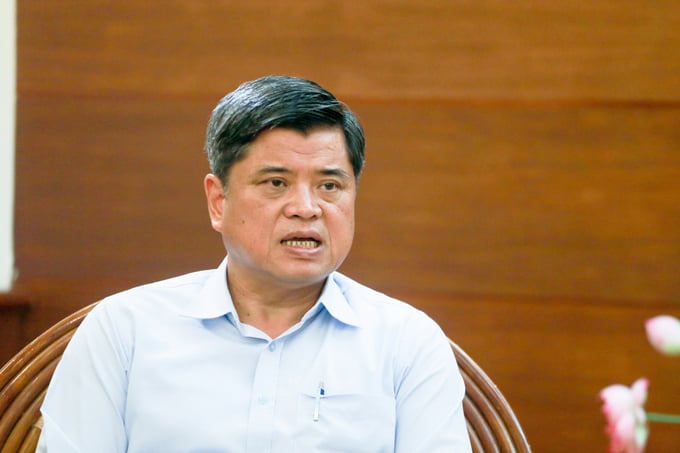
Deputy Minister of Agriculture and Rural Development Tran Thanh Nam. Photo: TL.
Over the years, Vietnam's agriculture has made many important achievements. Agricultural production has grown steadily, reaching an average growth of 2.62 per cent per year in the period 2016 - 2020. Products are increasingly diversified, many farming products have become key export goods of Vietnam. The agricultural sector makes an important contribution to economic development, ensuring national food security and social stability. Agriculture clearly shows its role as an important pillar of the economy and affirms a national advantage.
Besides achievements, Vietnam's agricultural production still has limitations including fragmented and small production, unsustainable growth, improper linkage between producers and enterprises.
Therefore, the Ministry of Agriculture and Rural Development is directing and coordinating with localities and businesses to implement a pilot scheme to build standard agricultural and forestry raw materials areas for domestic consumption and export for several products such as fruits in the Northern mountainous provinces and Dong Thap Muoi, certified forest timber in the Central Coast, coffee in the Central Highlands, and rice in the Mekong Delta.
For rice, over the past time, under the direction of the Ministry of Agriculture and Rural Development, the rice industry has also made positive changes towards more sustainability, applying sustainable farming processes. About 80 per cent of the specialised rice farming areas uses certified rice varieties. The ministry is also orienting to build high-quality rice material areas, reducing greenhouse gas emissions to better meet market requirements and contribute to the implementation of commitments to reduce greenhouse gas emissions of the country at COP26.
Can you talk more about the high-quality rice material areas?
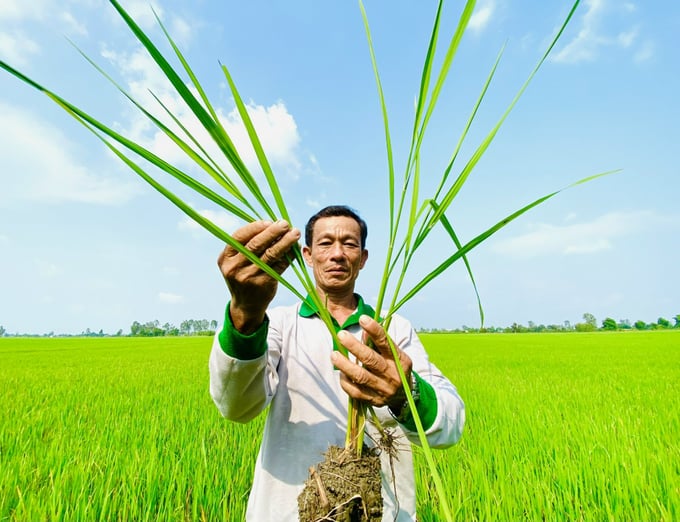
Sustainable farming processes, reduced greenhouse gas emissions will be applied in high-quality specialized rice production areas. Photo: Le Hoang Vu.
The high-quality rice areas under the ministry’s scheme must ensure the factors.
Firstly, certified rice varieties with high quality would be used there to meet the increasing requirements of domestic and international consumers, possibly towards the use of rice varieties that meet the nutritional needs of consumers and demand for deep processing, creating value-added products from rice.
Secondly, sustainable farming processes, reduced greenhouse gas emissions would be applied with reduction of input materials. With this farming system, rice production will save resources, less pollute environment and reduce emissions.
Thirdly, co-operation and association would be promoted to reduce production costs, increase value thanks to the links of production, processing and consumption. Farming households will be reorganised into cooperative groups and cooperatives, and will be linked more closely with enterprises that provide less expensive higher quality input materials as well as businesses that consume their outputs at stable, higher prices.
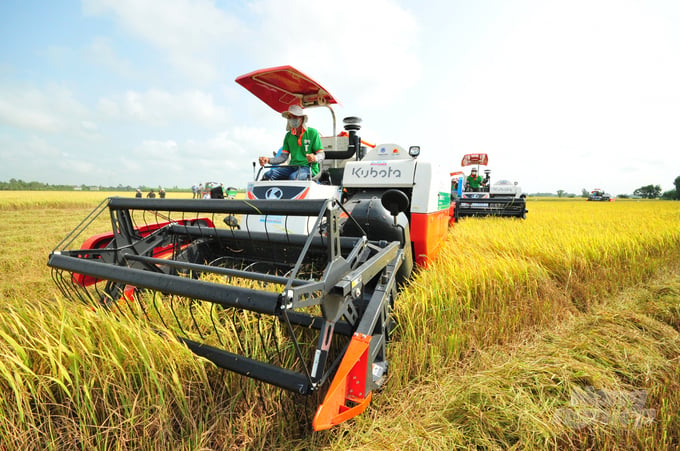
Mechanisation and infrastructure will be invested more synchronously in high-quality specialised rice production areas. Photo: Le Hoang Vu.
Fourthly, large-scale high-quality rice areas will be mechanised, invested in a more synchronous infrastructure system. Digitalisation, traceability and intergrated technologies would facilitate the disease prevention and control as well as automatic watering.
Fifthly, high-quality specialised rice production areas must be invested sustainably, which creates trust and higher income for rice farmers, making them confident to invest in rice production. At the same time, high-quality rice-growing areas will create added values by contributing to reducing greenhouse gas emissions, saving resources, reusing rice by-products according to a circular economy model, building rice brand for Vietnam.
What are roles and responsibilities of stakeholders in developing high-quality rice material areas?
Forming a value chain from production, processing and consumption of agricultural products plays an important role, requiring the participation and coordination of parties. In particular, the State plays the role of management, orienting the development of material area planning and formulating mechanisms and policies to encourage the development of the logistics system as well as build brands of "ecological rice", "low emission rice”.
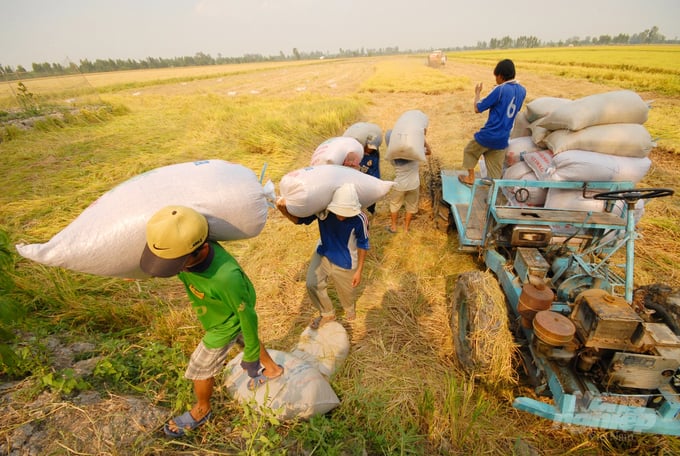
Elements in the rice production chain will continue to be linked more closely to reduce intermediate stages in production. Photo: Le Hoang Vu.
Industry associations and businesses play a leading role, sourcing input materials, and consuming output products to ensure the quality, efficiency and added value of agricultural products.
Rice farmers and cooperatives play a direct role in production and reorganise production according to standardised processes. Agricultural extension force also plays the role of a bridge to transmit scientific and technological knowledge and policy of the State to farmers.
The supports from domestic and international research institutes, universities, and international organisations (especially the International Rice Research Institute) are also needed in transferring scientific and technological achievements and orient the development trend of rice production according to global market demand.
What does the ministry plan to carry out the project on one million ha of high-quality specialised rice?
The ministry is implementing a pilot project to build areas of agricultural and forestry materials that meet standards for domestic consumption and export in the period 2022 - 2025 with an area of about 160,000 hectares in 13 provinces.
Recently, the Prime Minister has directed the ministry to develop a project on sustainable production of 1 million hectares of high-quality specialised rice in the Mekong Delta. We are assigning functional units to research and develop specific schemes for implementation.
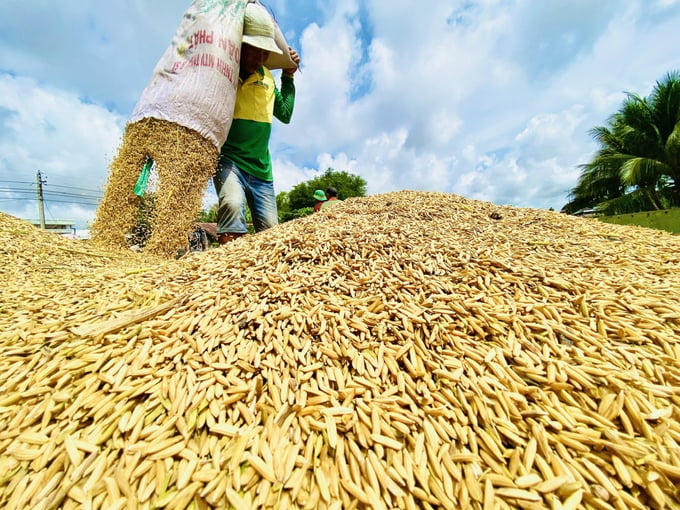
The Ministry of Agriculture and Rural Development is developing a project on sustainable production of one million hectares of high-quality specialised rice in the Mekong Delta. Photo: Le Hoang Vu.
From my point of view, first of all, we must understand that building a material area of one million hectares of high-quality specialized rice does not mean a fixed plan in terms of the location of the rice area allocated specifically for each province but rather on the basis of establishing basic criteria for high-quality specialized rice material areas.
The agriculture ministry will work with localities in the Mekong Delta, industry associations, rice enterprises, cooperatives, and farms to determine specific deployment areas in specified production areas.
Thank you!
"The organisation and developement of high-quality specialised rice areas for sustainable development requires time and overall resources. The participation and cooperation of local authorities in the Mekong Delta region, ministries, central branches, central socio-political organisations, international organisations, domestic and international institutes, businesses, cooperatives and farmers are very important to ensure sufficient resources and increase income for rice farmers.
Deputy Minister of Agriculture and Rural Development Tran Thanh Nam.
Translated by Hien Anh

(VAN) The UNESCO Global Geopark revalidation of Non nuoc Cao Bang and the transition to a two-tier administrative model are presently undergoing a pivotal moment in Cao Bang, the northernmost province of Vietnam.
/2025/06/13/5330-2-004539_953.jpg)
(VAN) Changing policy mindset and removing investment barriers are urgent requirements to open up new development space for enterprises in the agricultural sector.

(VAN) The areas include the restoration of five million hectares of marine ecosystems.

(VAN) Dr. Le Van Nguyen, Director of the Institute of E-Commerce Management (ECM), emphasizes the potential for green development through the cultivation of fruit trees, particularly in provinces such as Son La.

(VAN) VAAS and numerous Vietnamese enterprises have signed cooperation agreements with Japanese partners to promote agricultural technology and trade connectivity.
/2025/05/29/5625-12-214801_567.jpg)
(VAN) Provincial mergers in the Mekong Delta promise to streamline administration, expand inter-provincial raw material areas, and foster close linkages in agricultural value chains, benefiting both businesses and cooperatives.

(VAN) Merging Mekong Delta provinces contributes to the expansion of agricultural raw material areas, addressing previous constraints caused by provincial boundaries. Additionally, this expansion will reduce costs and strengthen linkages between businesses, cooperatives, and farmers.